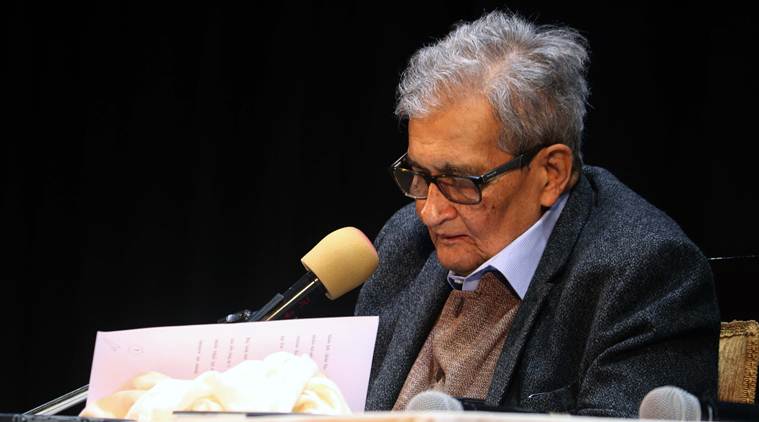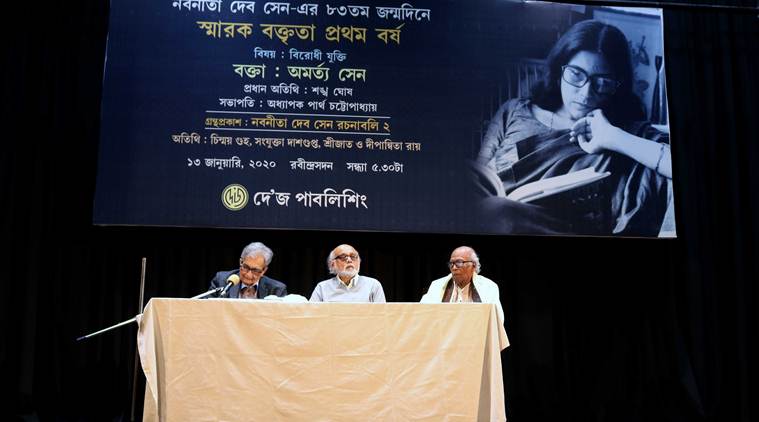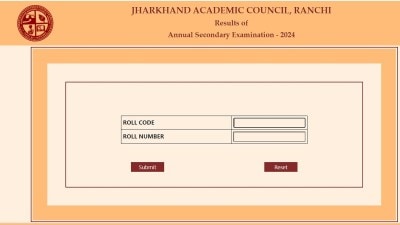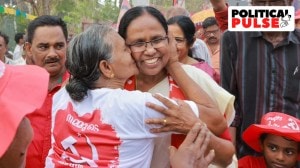- India
- International
Amartya Sen: ‘Should be deeply aware of what we are protesting against’
On the subject of protest, Amartya Sen said, “There may also be a sudden and spontaneous protest, as the French Revolution apparently was, but even that was preceded by years of writing and discourse.”
 Amartya Sen speaks at the first Nabaneeta Dev Sen Memorial Lecture in Kolkata on January 13, 2020. (Express Photo: Shashi Ghosh)
Amartya Sen speaks at the first Nabaneeta Dev Sen Memorial Lecture in Kolkata on January 13, 2020. (Express Photo: Shashi Ghosh)
“Before we protest, I believe it is critical that we understand exactly what it is that we’re protesting against. The logic of protest must be founded not on quarrels or arguments, but on the creative power of dialectics.” This is what Nobel Prize-winning economist Prof. Amartya Sen said in answer to a question at the end of the inaugural Nabaneeta Dev Sen Memorial Lecture, an annual event in memory of Bengali writer, scholar and educator and Sen’s first wife, who passed away on November 7 last year.
The lecture, instituted by Dev Sen’s publishers, also saw the release of a volume of her writings. The couple’s daughters Antara Dev Sen and Nandana Sen were present on the occasion.
On the subject of protest, Sen later said, “There may also be a sudden and spontaneous protest, as the French Revolution apparently was, but even that was preceded by years of writing and discourse.”
The theme of the lecture was ‘Birodhi Jukti’ (opposing argument), and Sen spoke of Dev Sen’s work on Rabindranath Tagore and the ways in which he was viewed in India and Europe, as well as her abiding interest in the Valmiki Ramayan and other examples of oral epic poetry, which led her to the concept of ‘Sitayan’, or an interpretation of the Ramayan from Sita’s perspective.
“Only when there is a vacuum in the existing narrative does the question of an opposing argument arise. In that sense, I believe there is room for argument regarding the patriarchy and class differences inherent in the Ramayan, and many of the questions raised about these issues in recent years were raised by Nabaneeta earlier,” said Sen, who described himself as a feminist, as he has on a few other occasions.

 The inaugural Nabaneeta Dev Sen Memorial Lecture was in memory of Bengali writer, scholar and educator and Sen’s first wife, who passed away on November 7 last year. (Express Photo: Shashi Ghosh)
The inaugural Nabaneeta Dev Sen Memorial Lecture was in memory of Bengali writer, scholar and educator and Sen’s first wife, who passed away on November 7 last year. (Express Photo: Shashi Ghosh)
“There is a need to examine if discrimination on grounds of gender, class or caste lead to discrimination on other grounds in other areas too, at home or out of it. And it is always a question of degree. If you ask me whether the economics of development have brought about a change, I would say it is nowhere near what we need. Similarly, feminism may have improved the plight of women, but nowhere near as much as we would like.”
As with Valmiki, so with Tagore, Sen advocated the need to go beyond existing canonical perspectives and put forth arguments to help fill their gaps. “Why did Tagore, whose image was that of a rationalist in India, and who was so firmly critical of Gandhi’s view that the Bihar earthquake (of 1934) was divine retribution (against untouchability), come across in the West as a man who was overly concerned with religion? Nabaneeta addressed this dichotomy in her doctoral thesis. She tried to find out whether, in his efforts to integrate East and West, Tagore was perhaps sending out contradictory messages,” he said.
The ongoing protests found an indirect way into the discussion. “If we see a violation of the Constitution, or basic human rights, we should protest. But we should be deeply aware of every aspect of that against which we are protesting,” said Sen.
Apr 19: Latest News
- 01
- 02
- 03
- 04
- 05






































